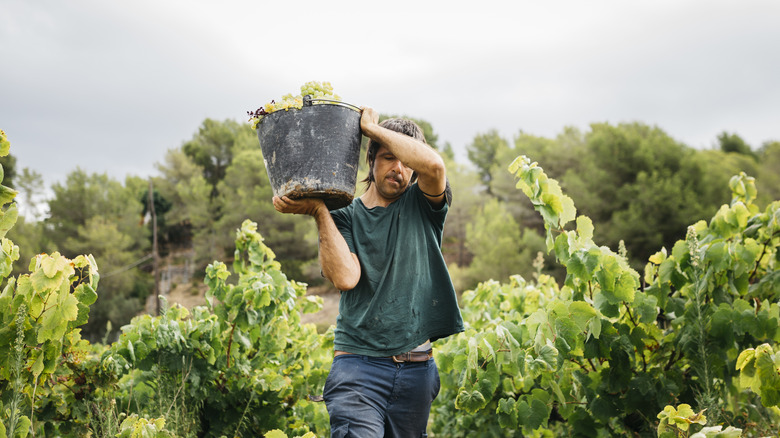How Climate Change Affects The Way Sparkling Wine Is Made
For centuries, France has been regarded as the crème de la crème of fine wine production, especially when it comes to sparkling wine. However, the Champagne-producing country has a new, unexpected competitor riding its coattails, and it's all because of climate change. A warmer climate has allowed English wine producers to grow grape varieties that they previously could not. These include pinot noir, pinot meunier, and Chardonnay, grapes which are all used to produce Champagne. Because of this, and several other benefits associated with England's warming climate, some English sparkling wines now have similar traits to high-quality Champagne. In other words, England is now a producer of premium sparkling wine.
The terroir of South England is helping the country's sparkling wine carve out its place in the industry. Many of the vines are cultivated in the area's chalky soil. This chalk-rich soil ensures that the vines enjoy good drainage and that mineral flavors — which are often associated with Champagne — are also present in English sparkling wine. What's more, some vineyards in Sussex receive a coastal breeze that adds flavor to the grapes and keeps them healthy.
While vineyards in South England are the main reason why English sparkling wine is getting attention, climate change means wineries located in North England and even Scotland are producing quality wine. Furthermore, a paper published in OENO One predicts that English winemakers will be able to produce high-quality, still white wines by 2050.
Is high-quality wine changing English culture?
The United Kingdom is experiencing an intense boom in wine production. In the spring of 2024, there were over 900 vineyards operating in the U.K., and overall bottle yields have increased drastically over the last few years. This growth is changing the English agricultural sector. Agricultural schools that once focused on growing classic English crops and keeping livestock are now teaching students how to grow grapes and make wine. Farms have also benefited by pivoting to wine production, gaining revenue from both sales and tourism.
Because of the change in the climate — and the economic opportunities it is creating — younger generations in England are beginning to search for careers in wine. It looks to be an increasingly stable sector; English wines have reached the global market and now sell across multiple continents. For this reason, more people than ever before will be reaching for English products when pairing sparkling wine with fried foods, oysters, or duck. However, it's important we don't get ahead of ourselves. English sparkling wine is a new competitor for Champagne, but given the amount of tea Brits drink, we doubt it'll become England's favorite beverage any time soon.

